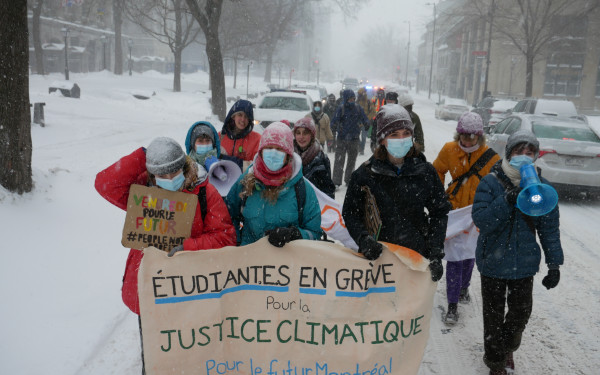Students at University of Montreal call for fossil fuel divestment
The school’s community protested the lack of transparency in fossil fuels investments reported at 13 million dollars in 2016
Students rallied outside the school’s administration office on Feb. 16, demanding that UdeM phase out fossil fuels from their Endowment and Pension Plan funds.
The demonstrations were held last Wednesday outside Pavillon Roger-Gaudry demanding divestments from oil companies such as Shell and Suncor Energy. The school claims they will reduce their fossil fuel energy consumption by 35 per cent by 2030, but that is not enough according to activists.
Écothèque are a group of student activists who advocate for social and ecological justice through eco-social projects and causes. Demands for divestment date back to 2012 and L’Écotheque is the current iteration of this movement. Their biggest campaign is the divestment of fossil fuels from the University of Montreal but they also host podcasts themed around the environment, their “Bibliotheque verte'' which serves as a resource guide on environmental challengesas well as an eco-social art hub. In November, the group launched a petition in support of divesting from fossil energy which as of Feb. 20 has reached over four thousand signatures.
According to documents provided by L’Écothèque, the endowment fund consists of private donations made to the university. It aims to support research, institutional projects, and scholarships for its students. The fund’s total holdings in the oil, gas, and fuel sector was estimated at nearly $13 million at the end of 2015, which is 4.3 per cent of the fund’s total assets of almost $300 million. The biggest investments from the fossil fuel industry include shares from Suncor Energy, Canadian Natural Resources, Cenovus Energy, Husky Energy, and Royal Dutch Shell.
Financing managed by external experts and University observers make it possible to divest away from fossil fuels if there's pressure on the school, explained Bruno Lecavalier, a member of Écothèque and its divestment committee.
“If the director says we want to divest away from that it can be done. The pension plan has a committee here. It’s more of a process, but it’s definitely still doable. It’s been done elsewhere,” said Lecavalier.
Groups like Divest Concordia and other climate justice and sustainability groups have emerged to help restructure investments into more sustainable energies. In 2019, Concordia University announced it would divest away from fossil fuels by 2025 in part because of pressure from these student groups.
According to a document shared by L’Écothèque, the University’s Pension Plan fund also holds oil shares totalling $119 million of $3.6 billion in 2015 which was roughly 3.3 per cent of the fund’s total capitals. Suncor Energy and Canadian Natural Resources represented around 23 per cent of total investments alone. The pension fund run by an external independent committee makes it more difficult for the university to diversify its funds, according to Lecavalier.
Another issue with these funds is the lack of transparency. In the 2020-2021 annual report, the plan only showed $1 billion of the $5 billion active investments, Lecavalier explained.
“We know there’s a lot more of these companies which are not showing these reports and since 2016, the university hasn’t released new information as far as how much they have in the sector.”
The university has promised to phase out some of their fossil fuel emissions. In 2020, UdeM declared that it would reduce its carbon intensity by 35 per cent between 2019 and 2030. However, according to L’Écothèque and its members, this plan is flawed.
“The 35% figure is a reduction of the carbon intensity, which is a metric in tons of CO2 per $1 million. It’s not even like a divestment,” said Lecavalier. Market levels dictate the metric and not ecological tactics Lecavalier added.
The students in the divestment committee believe that it’s not a real move away from fossil fuels and is just slowing the process while allowing the administration to claim they are becoming carbon neutral. “They have to divest if they want to reach their carbon neutrality by 2040 and right now, this metric is completely stopping them from doing that,” said Lecavalier.
The protest itself lasted roughly an hour and a half. Other groups that showed up included La Riposte Socialiste and the Political Science Student Association at UdeM. Over fifty or more members gathered at the administration doors. While attendees were peaceful, there was a moderate police and public security presence at the gathering.
The group has also dealt with alleged censorship from public security at school after putting up posters for their divestment from fossil fuels and their campaign for cleaner energy. Security went as far as going into the offices of professors, the Student Cafes Association and the student union’s office to remove these posters. These alleged actions against what the group claims is a violation of their freedom of speech has almost taken precedence over the issue of divestment, he explained.
One guard reportedly told the group that they were putting up propaganda against the University. Lecavalier said that another claimed Écotheque was inciting violence on campus and that’s why they were removing their posters.
“Some topics are more difficult to discuss and universities also have rules and we don’t want things to get out of control.” said Professor Trudeau. “However, I think it’s perfectly reasonable to put up posters on these investments. I don’t see why universities would not accept to have this.”
“Sometimes we get pointed out by the security guards because we know that they don’t like us,'' said Lecavalier. “We’re being shut down, left and right we’re being profiled and followed at school.
Teachers also attended the protest and have been supporting the movement by Écotheque. Professor at the faculty of medicine Louis Eric Trudeau believes the divestment campaign has been a long time coming. While he thinks that the University’s pledge to reduce carbon emissions shows good intentions, the school is a bit slow in their process.
"I understand that from an investment standpoint it’s hard to accept lower revenues or risks of lower revenues, but that it’s also debatable whether investments in fossil fuels are actually fruitful in terms of returns," said Trudeau. While student groups and teacher unions have requested ATI reports on the financials of the pension funds, there has been no further information since 2016.







